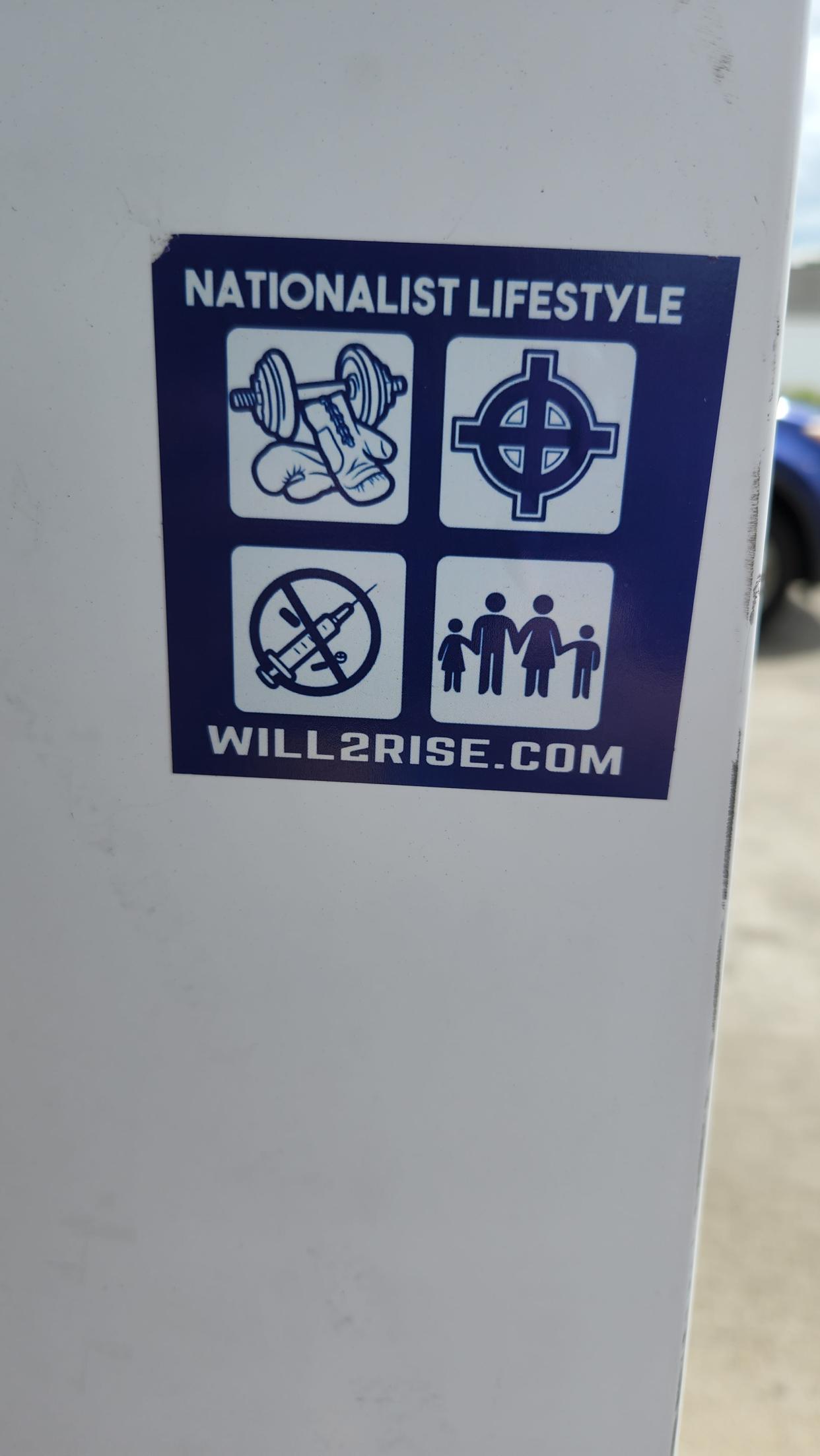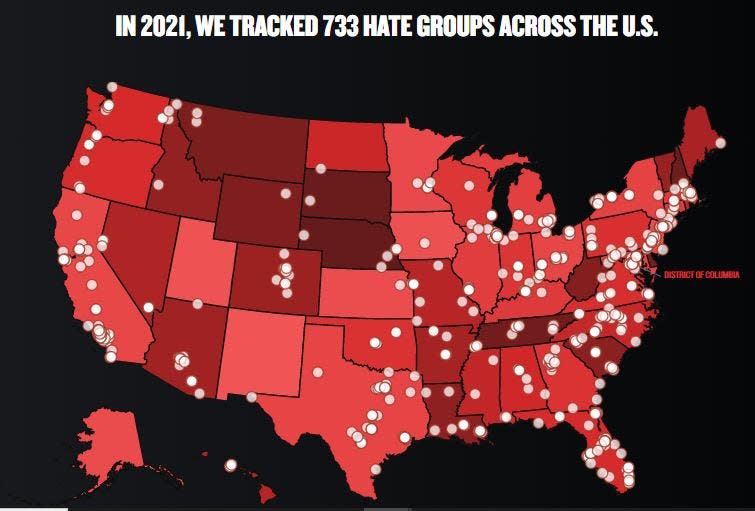Stickers promoting hate group found in Plain Township

It looks innocent enough: The blue sticker with white graphics depicts a traditional family, sports, a Celtic cross, and a symbol which could be interpreted as anti-drugs or anti-vaccination.
Spotted recently near a busy intersection in Plain Township, the sticker belongs to Will2Rise.com, a white nationalist organization. Willl2rise.com is an offshoot of the Rise Above Movement, which organizes "fight clubs" across the country to foster white masculinity.
Both were reportedly founded by Robert Rundo of southern California, who is under federal investigation and is believed to be in Europe.
Mapping Militants Project: Stanford University maps locations of militant organizations
More on hate groups: White supremacist threat remains, but experts see hope in combatting online extremism
Stark County Sheriff's Office spokeswoman Michaela Madison said the department has not fielded any calls or complaints about stickers. Last month on the heels of the Jayland Walker funeral, stickers emerged in downtown Akron with the slogan "White Lives Matter."
Timothy Dimoff, an Akron-based security expert said the risk such hate groups pose depends on how well they're organized, and their ability to use social media.
"They tend to attract to locations where there is higher controversy with police, such as the recent Akron police shooting with Jayland Walker," he said. "These types of incidents provide them with a much larger stage to stir up things and a much stronger ability to recruit since there is a 'local' cause they can attach their name and mission to it — then agitate the community."
Fueled by social media and a hodgepodge of mythology, religion, history, politics, antisemitism and everyday racism, white nationalism has been tagged by law enforcement and civil rights organizations as the biggest threat of domestic terror.
More: 'We've got to stop the hate.' Chadash Academy offers Jewish children support, education

Ohio ranks 11th for hate groups
According to a recent report by the Southern Poverty Law Center, Ohio ranks 11th in the nation, with 20 active hate groups; down from 38 in 2018.
But the problem is still serious enough that the Maltz Museum of Jewish Heritage in Beachwood and the Nancy & David Wolf Holocaust & Humanity Center in Cincinnati have created "Stop the Hate Ohio," a joint campaign to improve Holocaust education in the state.
Under the partnership, the two museums are offering a number of joint programs and workshops for Ohio residents.
"We do know there has been an increase in reporting anti-Semitic incidents; it's trending up. We've seen that locally in our own backyard," said Dahlia Fisher, the Maltz Museum's director of external relations. "Our programs are rooted in the Jewish value of respect for all humanity. We look at history to understand where we’ve been, and where we are now, and to consider our role in designing the future we want to live in. We give students the tools and language to identify that for themselves in their own space and time."
Fisher said one of the Maltz Museum's goals is to provide young people navigational tools. For 15 years, it has offered "Stop the Hate," a program aimed at middle and high school students, who are prime recruitment targets for hate groups.
"One of the conversations we're having is standing up for others as well as for ourselves," she said. "Our identities are complex. 'Bystander' or 'perpetrator' are labels through history that have been important. Which label is the one we want to identify with, who do we want to be?"
On Oct. 26, the museum will open a new traveling exhibit, "This Light of Ours," showcasing activists and photographers of the Civil Rights Movement and voter suppression.
'If it's national event, they can localize it.'
University of Dayton sociology professor Paul J. Becker, who has been studying nationalism since the 1980s, said such organizations often capitalize on national events.
"The shooting in Akron is a way they can kind of build off of that," he said referring to the police shooting of Walker. "If it's a national event, they can localize it."

Becker said groups may be emboldened by where Ohio is politically.
"We used to be a swing state; I'm not sure if that is true anymore," he said. "We've moved to the right as a state. They may feel the politics are more aligned with those views. There's a bill being discussed to require teachers to teach both sides of the Holocaust. Maybe they're being more visible because they feel their ideas are more in line with what some politicians believe and support."
Asked if the Celtic cross on the Will2Rise.com sticker is a contradiction in that it represents a faith started by Jews, Becker said there's a lot of variation in what they believe about Christianity.
"When I started looking at these groups in the 1980s, there was a lot of talk about the Christian Identify movement," he said. "They have their own interpretations."
Hatred is taught
Becker, said one theory he's heard is that nonwhites were created first, but that "God realized he made a mistake" and corrected it by creating whites.
Becker said some Christian nationalists also believe that the Bible's Book of Revelation forecasts a race war "to complete God's wishes that whites rule the earth."
He agrees that such extremists are the biggest threat to domestic security.
"With the election of Donald Trump, they felt they had an ally," he said. "From Charlottesvillle, where he talked about 'both sides' and where Heather Heyer was killed while protesting, to him telling the Proud Boys to 'Stand back and stand by,' they felt he was giving marching orders."
Becker also cites other instances, like the growing popularity of the "Great Replacement Theory," which has been advocated by Fox News host Tucker Carlson.
"Right now, I think what happens in the next two years with elections is going to be critical," Becker said. "Who is going to be in office in 2024? Are they going to feel, 'Hey have an ally in the White House?' I'm not a political scientist, but there's a lot of talk about groundwork to overturn the 2024 election. I feel the next few years are going to be critical."
Dimoff said exposure is the best way to combat extremism — "monitoring who they are, leaders of the group, and exposing their negative intentions that are outside the real issues being debated."
"Also, point out their negative incidents that took place by them in other cities, etcetera," he added.
Fisher said two of the Maltz Museum's most important artifacts are two matching Ku Klux Klan robes. One is for an adult. The other child-sized.
They're important, she said, because they prove that hatred is taught.
"It's not a story that's unfamiliar," she said. "We see clearly that a child is taught; you can look at those two robes and instantly know that someone put that robe on someone else's body. The same way a child can learn to hate, a child can learn to love."
Reach Charita at 330-580-8313 or charita.goshay@cantonrep.com
On Twitter: @cgoshayREP
This article originally appeared on The Repository: Will2Rise stickers found in Plain Township

